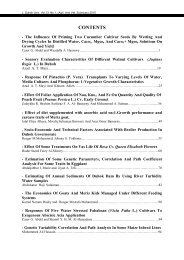You also want an ePaper? Increase the reach of your titles
YUMPU automatically turns print PDFs into web optimized ePapers that Google loves.
J. Duhok Univ., Vol. 14, No.1 (Pure and Eng. Sciences), Pp 1-8, 2011<br />
GOVERNING THE TERRITORY IN A PHASE OF GLOBALIZATION:<br />
THE ISSUE OF THE TERRITORIAL PLANNING<br />
AND THE LOCAL DEVELOPMENT<br />
MAJED ALI KAREEM<br />
Urban & Regional Planning, University of Venice-Italy<br />
(Received: January 22, 2009; Accepted for publication: November 28, 2010)<br />
ABSTRACT<br />
One of the consequences of the present of the financial, communicative and decisional nets globalization is to make<br />
ineffective the traditional instruments for the direct control of the territory by the public authorities. The territories<br />
are nowadays structured in over-regional and over-national nets and fluxes which tend to establish direct relations<br />
with the single local systems (i.e., towns, districts, regions, tourist resorts, etc).<br />
In this complex situation, the territorial planning shall thus and in first place propose itself as governance, that is<br />
to say as governing negotial process for the cooperative and conflictual interactions between subjects which are<br />
capable, for various reasons, to act on the territory and transform it.<br />
The scope of this research is to investigate on the role of the territorial planning in relation with two relational<br />
aspects: global and local. The target is that to locate a methodological approach able to have an “open” view to the<br />
territorial phenomenon in a globalized context; to define the territorial planning’s role, procedures and instruments.<br />
T<br />
PROBLEM DEFINITION<br />
he territory becomes ever more<br />
fragmented in parts, each one of which<br />
tends to become a “junction” of over-local<br />
networks and, therefore, to follow different<br />
development routes according to the long<br />
distance relation system to which it belongs. At<br />
the same time each one of these subjects<br />
depends ever less from those relations of<br />
physical proximity with the contiguous<br />
territories, which were the territorial planning’s<br />
existence and operative justification. The<br />
proximity relations continue, anyway, to be<br />
important also and above all in order to optimize<br />
the long distance local relations; but just for this<br />
reason they risk to be subordinate to an<br />
exogenous rationality which tend to impose<br />
itself as the territorial organization’s principle<br />
also at a local level.<br />
In order to plan rationally a territory it should<br />
be necessary to check this nets body which<br />
however, for its trans-national nature, today is<br />
not directly controllable by any public authority.<br />
On the other end neither these “long nets” nor<br />
the organizations which operates them can<br />
directly control the territories which they use as<br />
“anchorages” for their junctions and as physical<br />
paths of their fluxes. They interact with the<br />
territories and try to obtain “competitive<br />
advantages” through a series of negotiations<br />
with those private and public subjects who, for<br />
various reasons, operate or have competences on<br />
a local level.<br />
WHAT ROLE FOR THE<br />
TERRITORIAL PLAN?<br />
The role of the “Territorial Plan” 1 today and<br />
in the next future, must be placed in the local<br />
development context 2 . It has to take into<br />
account, above all, the growing role of the<br />
municipalities-being the base level of the<br />
territory governance – and of the pluralities of<br />
the institutions involved by the growing<br />
environmental problems’s expansion and<br />
complexity, but also by the ever major difficulty<br />
to govern the local effects (Perulli, P., 2000), of<br />
decisions taken elsewhere and which are taken<br />
basing on pure sectorial rationalities. Its role<br />
seems to be usefully subdivisible in three main<br />
directions: knowledge and evaluation, strategic<br />
orientation and netting, in being conflicts’<br />
adjustment.<br />
a) A first function concerns the cognitive and<br />
evaluation support which the territorial plan can<br />
supply to all the subjects, capable, for various<br />
reasons, to affect the territorial and urban<br />
conditions and dynamics (Mazza L., 1997).<br />
This function is important locally, not only the<br />
local authonomies couldn’t be efficaciously<br />
excercised unless on the base of an adequate<br />
knowledge of the reality into which they are<br />
asked to weigh heavily (and often such a<br />
knowledge is precluded to the Municipalities for<br />
territorial dimensions and technical, professional<br />
and administrative resources). In general, there<br />
could be not an effective dialogue between the<br />
various interested subjects unless it would be on<br />
the base of data and objective ties’ common<br />
1



